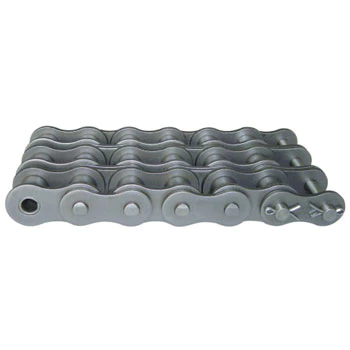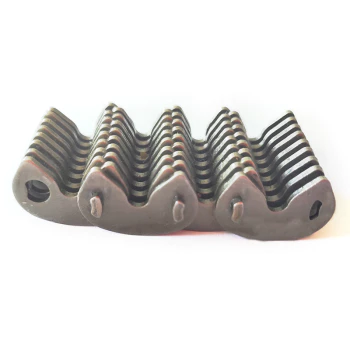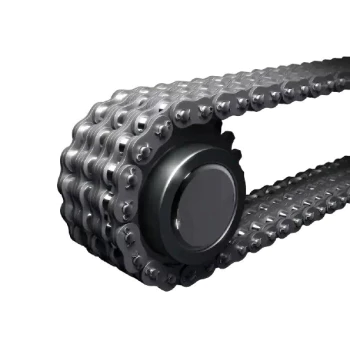Product Description
Escalator Spare Parts Escalator Drive Chain(20A-2F,20B-2F)
Specification:Escalator Step Chain / Auto Passage conveyor chain
Pack Detail:
Company Detail:
Company Detail:
1.TAI with sophisticated CNC equipment, advanced technology and perfect inspection equipment produce all kinds of chains, sprockets and other transmission equipments which can make the customers’ trust. The company since its establishment has passed ISO9001 and other certifications.
2.”High quality, high benefit, high standards” to sing more integrated into the world. Adhering to the “good faith service to customers” purposes, from being in order to after-sales service, each bit closely link, TAI will provide the most intimate, comprehensive service.
3.”Meet the customers’ requirement, until customers’ satisfaction” is our goal from start to finish, better innovation and better cooperation can create better TAI to service the world. Let us work together, to create a better future with each other.
Welcome contact for more details.
**************************************
| ISO Chain No. |
Pitch (mm) |
Roller Dia (mm) |
Width between inner plates (mm) |
Pin Dia (mm) |
Inner Plate Depth(mm) |
Transverse Pitch (mm) |
Ultimate tensile strength (kN) |
Average tensile strength (kN) |
Weight per meter (kg/m) |
| 16A-2F | 25.4 | 15.88 | 15.75 | 7.92 | 24.13 | 29.29 | 111.2 | 143 | 5.15 |
| 16B-2F | 25.4 | 15.88 | 17.02 | 8.28 | 21.08 | 31.88 | 106 | 126.5 | 5.42 |
| 20A-2F | 31.75 | 19.05 | 18.9 | 9.53 | 30.18 | 35.76 | 173.5 | 215.6 | 7.8 |
| 20B-2F | 31.75 | 19.05 | 19.58 | 10.19 | 26.42 | 36.45 | 170 | 210 | 7.2 |
/* January 22, 2571 19:08:37 */!function(){function s(e,r){var a,o={};try{e&&e.split(“,”).forEach(function(e,t){e&&(a=e.match(/(.*?):(.*)$/))&&1
| Material: | Carbon Steel |
|---|---|
| Structure: | Roller Chain |
| Surface Treatment: | Polishing |
| Chain Size: | 1/2"*3/32" |
| Feature: | Heat Resistant |
| Trade Style: | Trade/Manufacture/OEM |
| Customization: |
Available
| Customized Request |
|---|

Can a drive chain be used in a chemical or petrochemical processing application?
Yes, a drive chain can be used in chemical or petrochemical processing applications where reliable power transmission is required. Here is a detailed explanation:
Chemical and petrochemical processing industries involve the handling, mixing, and processing of various substances, including corrosive chemicals, solvents, and hydrocarbons. Drive chains offer several advantages in these applications:
- Corrosion Resistance: Drive chains can be selected or specially designed with materials that offer corrosion resistance. Stainless steel, high-performance alloys, or coatings can be applied to the chain components to withstand the corrosive effects of chemicals and maintain chain integrity and performance.
- High Load Capacity: Chemical and petrochemical processing often involves heavy-duty operations and the movement of large loads. Drive chains are designed to handle high load capacities, providing reliable power transmission and withstanding the demanding conditions of these applications.
- Precise Control: Drive chains provide precise control over the movement of equipment and processes in chemical and petrochemical plants. The interlocking design of the chain and sprockets allows for accurate positioning, speed control, and synchronization of various components and machinery.
- Wide Operating Temperature Range: Drive chains can be engineered to operate in a wide temperature range, accommodating the temperature variations encountered in chemical and petrochemical processing. High-temperature materials or lubricants can be used to ensure optimal performance under extreme conditions.
- Resistance to Harsh Environments: Chemical and petrochemical processing environments may involve exposure to extreme temperatures, humidity, dust, and other harsh conditions. Drive chains are designed to withstand these environments, with features such as seals, specialized coatings, or materials that offer protection against contaminants and maintain reliable operation.
- Long Service Life: Drive chains, when properly selected, installed, and maintained, can provide long service life in chemical and petrochemical processing applications. Regular inspection, lubrication, and tension adjustment help optimize chain performance and minimize downtime due to chain failure.
When selecting a drive chain for chemical or petrochemical processing applications, factors such as corrosion resistance, load capacity, temperature range, speed requirements, and compatibility with industry regulations should be considered.
It is important to implement proper maintenance practices, including regular inspection, lubrication, and tension adjustment, to ensure the optimal performance and longevity of the drive chain in chemical and petrochemical processing applications.
By utilizing drive chains in chemical and petrochemical processing, operators can benefit from corrosion resistance, high load capacity, precise control, wide temperature range, resistance to harsh environments, long service life, and reliable power transmission, contributing to efficient and safe processing operations.

How does the elongation of a drive chain affect its performance?
The elongation of a drive chain can have a significant impact on its performance and overall operation. Here is a detailed explanation:
Drive chains are subject to wear and elongation over time due to factors such as load, speed, tension, lubrication, and maintenance. Elongation refers to the increase in the chain’s pitch length, which can lead to several performance-related issues:
- Loss of Tension: As a chain elongates, it loses tension and becomes slack. This results in a loss of power transmission efficiency and can lead to skipping or jumping of the chain on the sprockets. A slack chain may also cause a loss of accuracy and synchronization in driven systems.
- Poor Performance: Elongation can affect the overall performance of the drive system. It can lead to increased backlash, reduced precision, and the potential for chain derailment or disengagement from the sprockets. These issues can result in decreased efficiency, unreliable operation, and increased risk of damage to the chain or other components.
- Increased Wear: Elongation causes increased wear between the chain links, pins, and bushings. This wear can accelerate the elongation process and further decrease the chain’s performance and service life. It can also lead to increased friction, heat generation, and the potential for chain failure if not addressed promptly.
- Reduced Load-Carrying Capacity: Elongation reduces the effective pitch length of the chain, resulting in a decreased load-carrying capacity. This can limit the chain’s ability to handle heavy loads, potentially leading to premature failure or inadequate performance in applications where high loads are involved.
- Increased Noise and Vibration: Elongation can cause increased noise and vibration during chain operation. The slack chain may produce rattling or banging sounds, and the vibration can negatively affect the overall system performance and operator comfort.
Regular inspection and maintenance are essential to monitor chain elongation and address it promptly. Measuring elongation using specialized tools and following the manufacturer’s recommended elongation limits can help determine when a chain requires replacement or adjustment.
Proper chain tension, lubrication, and regular maintenance practices, including periodic tension adjustment and lubrication replenishment, can help minimize elongation and ensure optimal chain performance. It is important to follow the manufacturer’s guidelines and consult with experts or technicians to establish appropriate maintenance schedules and procedures for the specific drive chain and application.

What are the load capacities of different drive chains?
The load capacity of a drive chain depends on various factors, including the type of chain, its size, design, and material. Here is a general overview of the load capacities for different drive chains:
- 1. Roller Chains: Roller chains are commonly used and have a wide range of load capacities. The load capacity can vary based on the chain’s pitch size, roller diameter, and the material used. Standard roller chains can handle loads ranging from a few hundred pounds to several thousand pounds.
- 2. Double Pitch Chains: Double pitch chains typically have a larger pitch, resulting in increased spacing between the chain links. They are often used in applications with lighter loads and slower speeds compared to standard roller chains.
- 3. Leaf Chains: Leaf chains are known for their high tensile strength and are commonly used in heavy-duty applications that require lifting or load-bearing. They have excellent load-carrying capabilities and can handle loads ranging from several thousand pounds to tens of thousands of pounds.
- 4. Silent Chains: Silent chains, also known as inverted-tooth chains, are used in high-speed applications that require high-load capacity and precise synchronization. They have robust load-carrying capabilities and can handle significant loads while operating smoothly.
- 5. Engineered Chains: Engineered chains, such as drive chains, plastic chains, or self-lubricating chains, may have varying load capacities depending on their design and intended applications. These chains are often designed to meet specific load requirements in specialized industries.
It’s important to note that load capacities can vary within each chain type based on specific configurations and manufacturer specifications. When selecting a drive chain for a particular application, it is crucial to consider the expected load requirements and consult the manufacturer’s guidelines and specifications to ensure that the chosen chain is suitable for the intended load capacity.


editor by CX 2024-04-26
